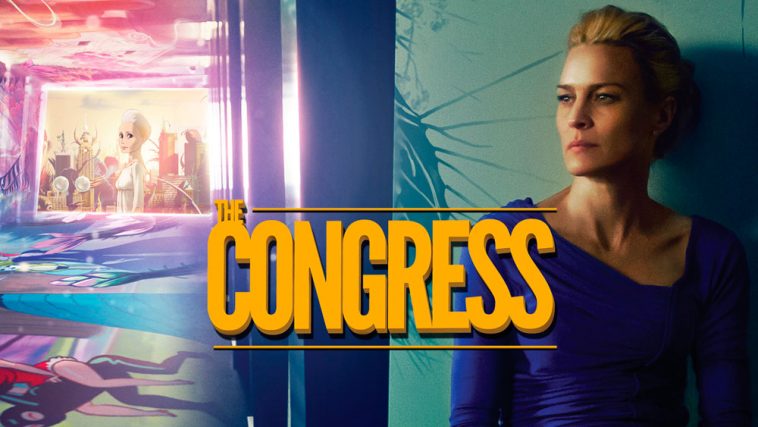Ari Folman, Francia, Israele, Belgio, Polonia, Lussenburgo, Germania, 2013, 122′ | Sci-Fi Club
Robin Wright, che interpreta se stessa, riceve da un grande Studio l’offerta di vendere la sua identità cinematografica: verrà scansionata e di lei verrà creato un campione così che lo Studio possa utilizzare la sua immagine a piacimento in qualsiasi tipo di film di Hollywood – anche i più commerciali da lei in precedenza spesso rifiutati. In cambio, Robin riceverà una cospicua somma di denaro, ma soprattutto, lo Studio promette di mantenere il suo alias digitale per sempre giovane – per l’eternità – in ogni film. Il contratto ha una validità di vent’anni.
È a questo punto che Robin viene catapultata in un mondo animato dove si scoprono le sue tribolazioni successive alla firma e fino al momento in cui lo Studio decide di trasformarla in una formula chimica.
“Nel suo romanzo Il Congresso del Futuro, il grande scrittore di fantascienza Stanislaw Lem predisse una dittatura chimica mondiale ad opera di importanti case farmaceutiche. Scritto nei tardi anni sessanta, il libro ci racconta un mondo in cui i produttori di medicinali hanno il pieno controllo sulle nostre emozioni, dall’amore e i desideri, alla gelosia e la paura. Lem, considerato il più grande profeta e filosofo della fantascienza (assieme a Philip K. Dick), non aveva idea di quanto la sua previsione fosse azzeccata rispetto agli albori del terzo millennio. Nel mulinello psicochimico predetto da Lem, l’adattamento cinematografico di questo romanzo introduce le attuali tecnologie cinematografiche del 3D e del motion capture, che minacciano di soppiantare il cinema con cui siamo cresciuti.
Nell’era post-Avatar, ogni regista deve riflettere se gli attori in carne ed ossa che da sempre popolano la nostra immaginazione sin da bambini possano essere rimpiazzati da immagini 3D generate da un computer. Questi personaggi computerizzati sono in grado di creare in noi lo stesso entusiasmo e la stessa eccitazione? E alla fine, importa davvero?”
–
Robin Wright, who plays herself, receives an offer from a large Studio to sell her cinematic identity: it will be scanned and a sample will be created of her so that the Studio can use her image at will in any type of Hollywood film. – even the most commercial ones you previously often refused. In return, Robin will receive a hefty sum of money, but most importantly, the Studio promises to keep its digital alias forever young – for eternity – in every film. The contract is valid for twenty years.
It is at this point that Robin is catapulted into an animated world where her tribulations following the signing are discovered and until the moment when the Studio decides to transform it into a chemical formula.
“In his novel The Congress of the Future, the great science fiction writer Stanislaw Lem predicted a world chemical dictatorship by major pharmaceutical companies. Written in the late 1960s, the book tells us about a world in which drug manufacturers are in full control. about our emotions, from love and desires, to jealousy and fear. Lem, considered the greatest prophet and philosopher of science fiction (along with Philip K. Dick), had no idea how accurate his prediction was compared to the dawn of Third Millennium In the psycho-chemical whirlwind predicted by Lem, the film adaptation of this novel introduces the current film technologies of 3D and motion capture, which threaten to supplant the cinema we grew up with.
In the post-Avatar era, every director must reflect on whether the real-life actors who have always populated our imagination since childhood can be replaced by computer-generated 3D images. Are these computer characters able to create the same enthusiasm and excitement in us? And in the end, does it really matter? ”






